ACCT20074: Analysis of Financial and Sustainability Reporting Concepts
VerifiedAdded on 2023/03/30
|19
|3775
|215
Report
AI Summary
This report, prepared for ACCT20074, examines contemporary accounting theory, focusing on financial and sustainability reporting. Part A delves into the conceptual framework for financial reporting, exploring its historical development in the USA, UK, and Australia, as well as issues raised by accounting professionals regarding its application of IASB/IFRS. It also discusses the framework's benefits and limitations, and evaluates the annual report of Australian Agricultural Company Limited (AACL) based on the framework's guidelines. Part B shifts the focus to sustainability reporting, comparing the Global Reporting Initiative (GRI) and the International Integrated Reporting Framework. It also assesses the usefulness of conventional accounting techniques for sustainability reporting, applies relevant theories, and analyzes the integrated reporting practices of a South African company, comparing them with the sustainability reporting of AACL. The report concludes with an overview of the key findings and implications of the analysis.
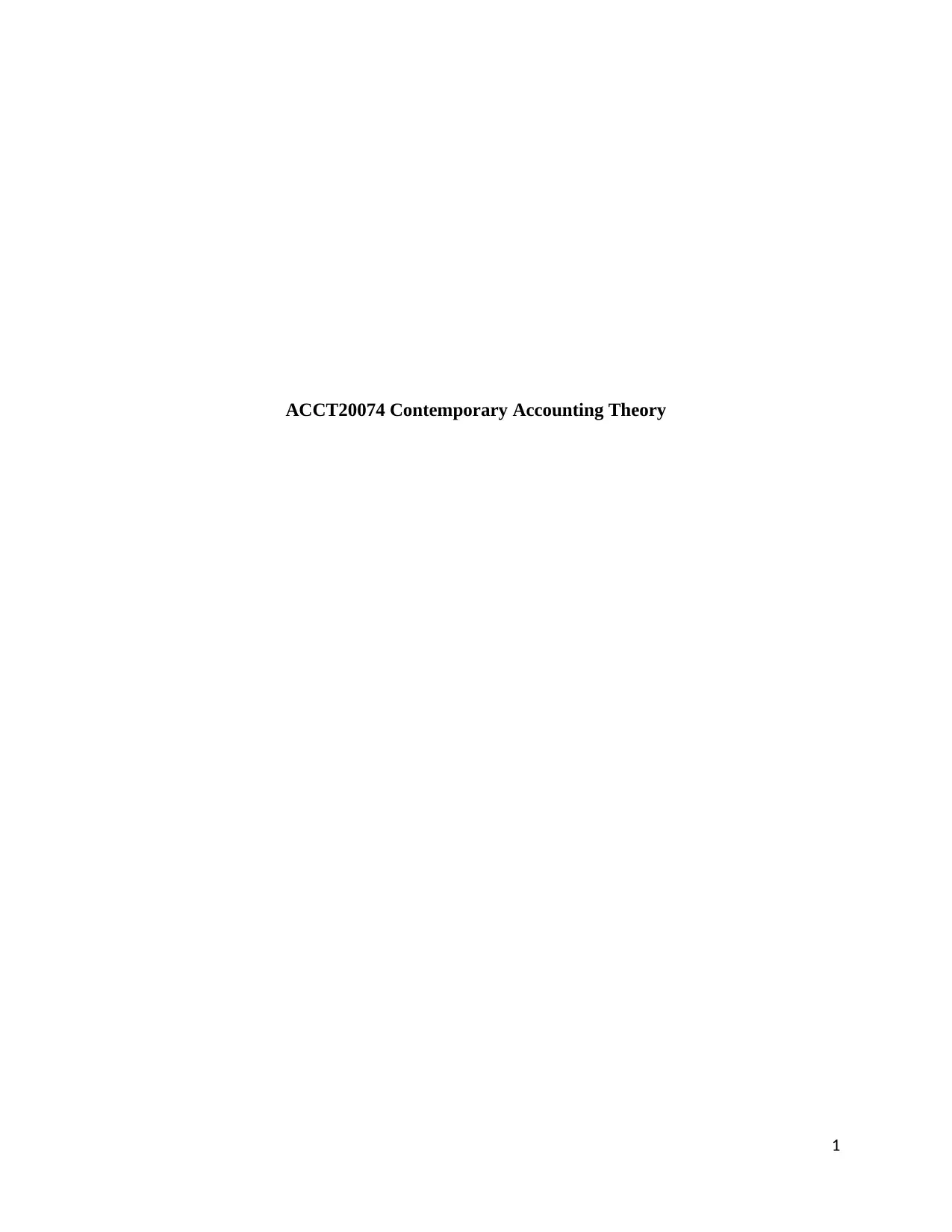
ACCT20074 Contemporary Accounting Theory
1
1
Paraphrase This Document
Need a fresh take? Get an instant paraphrase of this document with our AI Paraphraser
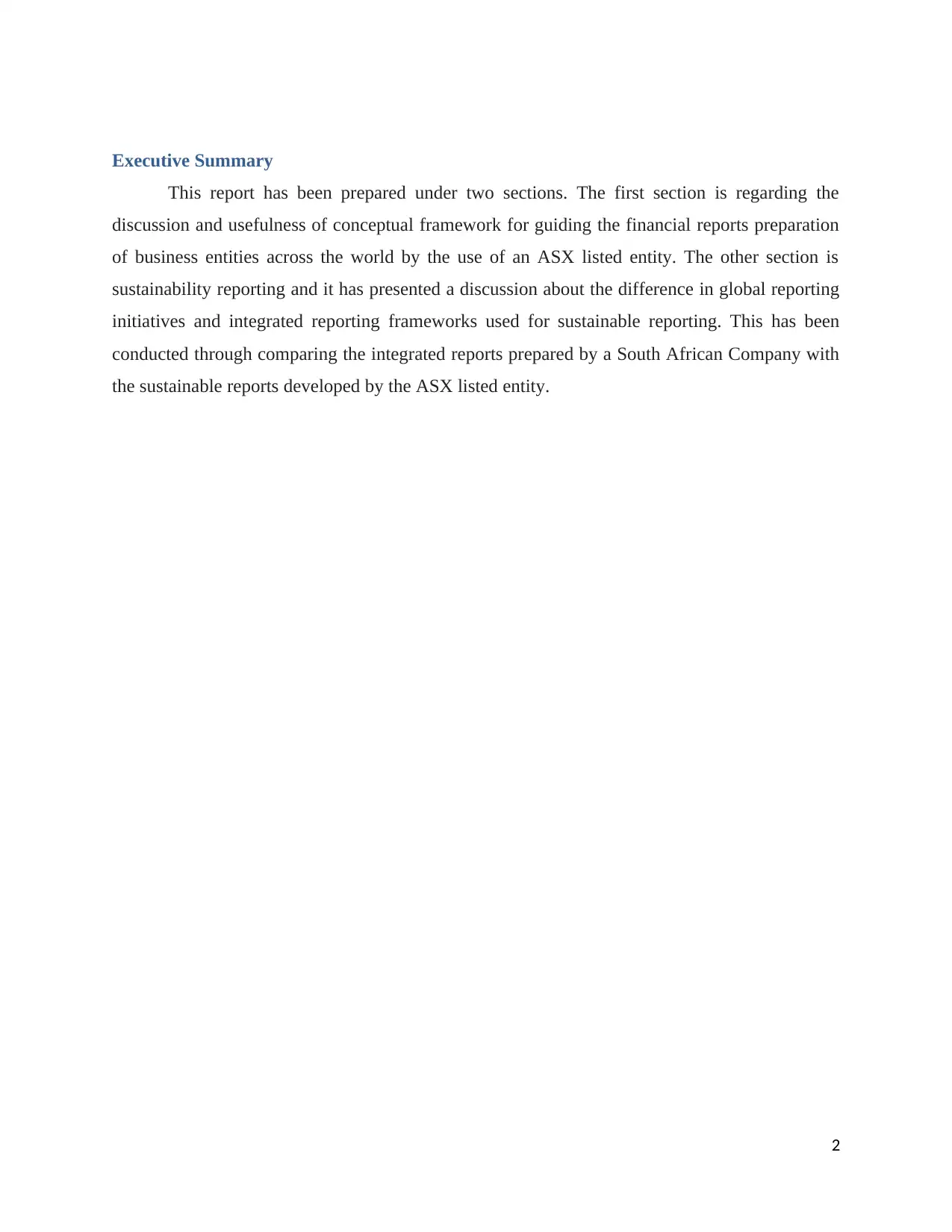
Executive Summary
This report has been prepared under two sections. The first section is regarding the
discussion and usefulness of conceptual framework for guiding the financial reports preparation
of business entities across the world by the use of an ASX listed entity. The other section is
sustainability reporting and it has presented a discussion about the difference in global reporting
initiatives and integrated reporting frameworks used for sustainable reporting. This has been
conducted through comparing the integrated reports prepared by a South African Company with
the sustainable reports developed by the ASX listed entity.
2
This report has been prepared under two sections. The first section is regarding the
discussion and usefulness of conceptual framework for guiding the financial reports preparation
of business entities across the world by the use of an ASX listed entity. The other section is
sustainability reporting and it has presented a discussion about the difference in global reporting
initiatives and integrated reporting frameworks used for sustainable reporting. This has been
conducted through comparing the integrated reports prepared by a South African Company with
the sustainable reports developed by the ASX listed entity.
2
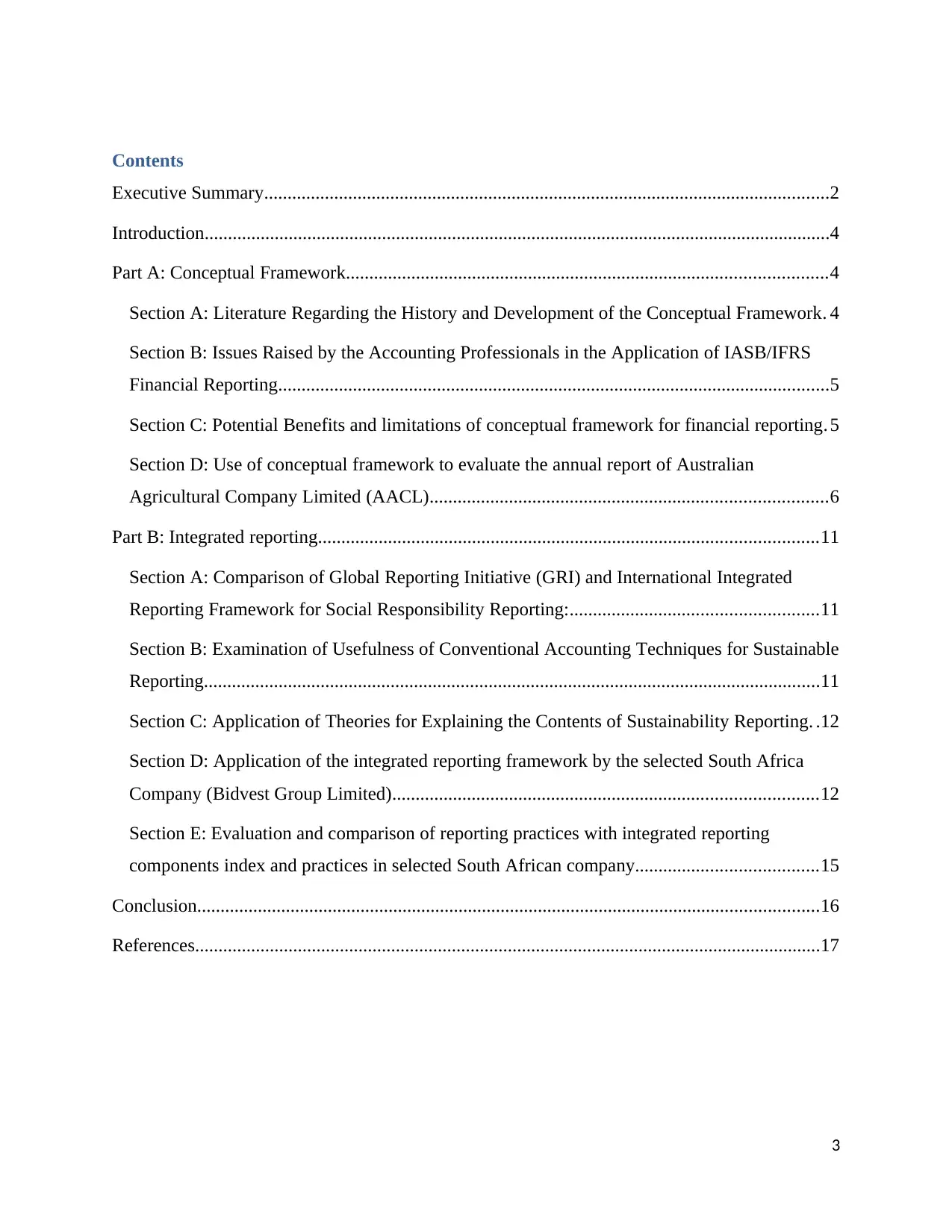
Contents
Executive Summary.........................................................................................................................2
Introduction......................................................................................................................................4
Part A: Conceptual Framework.......................................................................................................4
Section A: Literature Regarding the History and Development of the Conceptual Framework. 4
Section B: Issues Raised by the Accounting Professionals in the Application of IASB/IFRS
Financial Reporting......................................................................................................................5
Section C: Potential Benefits and limitations of conceptual framework for financial reporting. 5
Section D: Use of conceptual framework to evaluate the annual report of Australian
Agricultural Company Limited (AACL).....................................................................................6
Part B: Integrated reporting...........................................................................................................11
Section A: Comparison of Global Reporting Initiative (GRI) and International Integrated
Reporting Framework for Social Responsibility Reporting:.....................................................11
Section B: Examination of Usefulness of Conventional Accounting Techniques for Sustainable
Reporting....................................................................................................................................11
Section C: Application of Theories for Explaining the Contents of Sustainability Reporting. .12
Section D: Application of the integrated reporting framework by the selected South Africa
Company (Bidvest Group Limited)...........................................................................................12
Section E: Evaluation and comparison of reporting practices with integrated reporting
components index and practices in selected South African company.......................................15
Conclusion.....................................................................................................................................16
References......................................................................................................................................17
3
Executive Summary.........................................................................................................................2
Introduction......................................................................................................................................4
Part A: Conceptual Framework.......................................................................................................4
Section A: Literature Regarding the History and Development of the Conceptual Framework. 4
Section B: Issues Raised by the Accounting Professionals in the Application of IASB/IFRS
Financial Reporting......................................................................................................................5
Section C: Potential Benefits and limitations of conceptual framework for financial reporting. 5
Section D: Use of conceptual framework to evaluate the annual report of Australian
Agricultural Company Limited (AACL).....................................................................................6
Part B: Integrated reporting...........................................................................................................11
Section A: Comparison of Global Reporting Initiative (GRI) and International Integrated
Reporting Framework for Social Responsibility Reporting:.....................................................11
Section B: Examination of Usefulness of Conventional Accounting Techniques for Sustainable
Reporting....................................................................................................................................11
Section C: Application of Theories for Explaining the Contents of Sustainability Reporting. .12
Section D: Application of the integrated reporting framework by the selected South Africa
Company (Bidvest Group Limited)...........................................................................................12
Section E: Evaluation and comparison of reporting practices with integrated reporting
components index and practices in selected South African company.......................................15
Conclusion.....................................................................................................................................16
References......................................................................................................................................17
3
⊘ This is a preview!⊘
Do you want full access?
Subscribe today to unlock all pages.

Trusted by 1+ million students worldwide
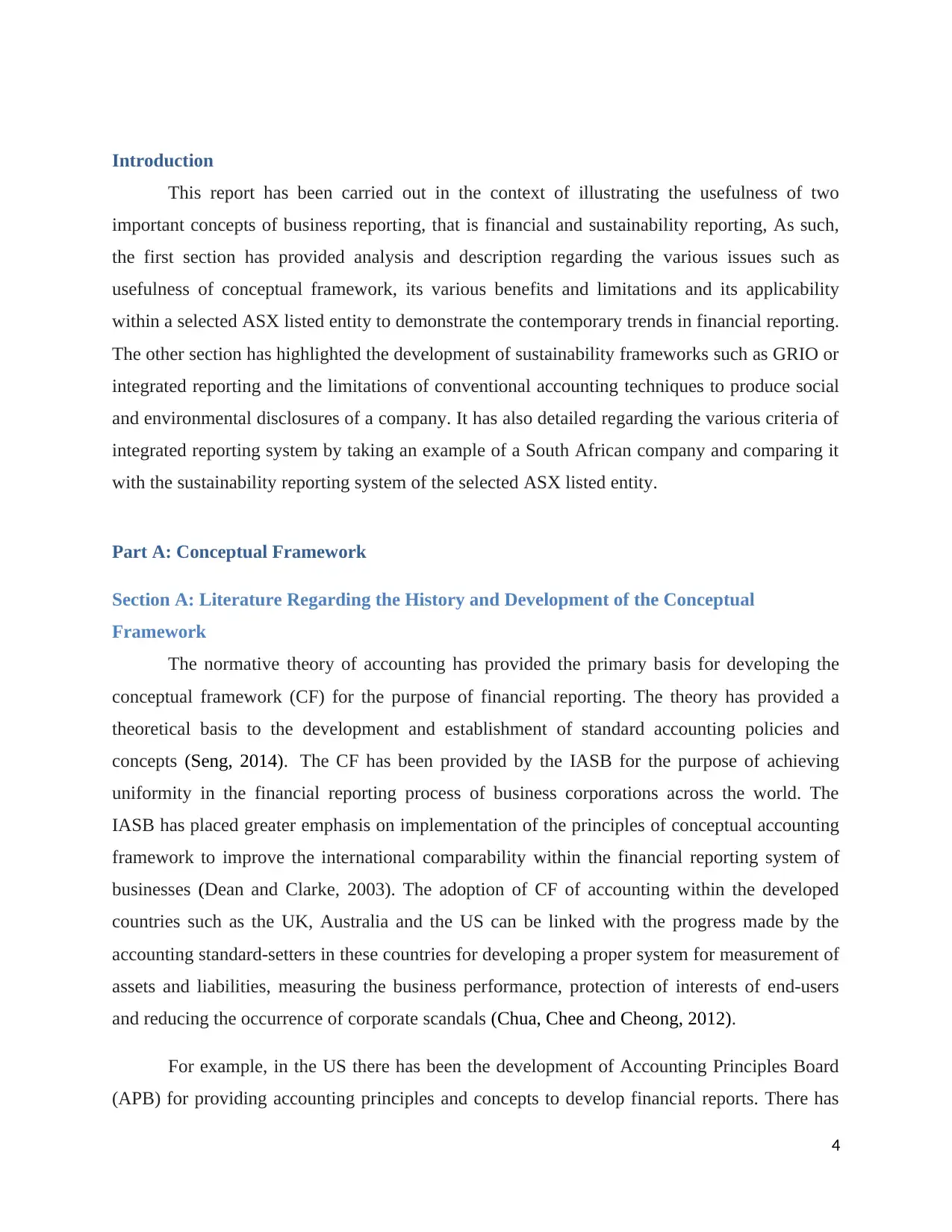
Introduction
This report has been carried out in the context of illustrating the usefulness of two
important concepts of business reporting, that is financial and sustainability reporting, As such,
the first section has provided analysis and description regarding the various issues such as
usefulness of conceptual framework, its various benefits and limitations and its applicability
within a selected ASX listed entity to demonstrate the contemporary trends in financial reporting.
The other section has highlighted the development of sustainability frameworks such as GRIO or
integrated reporting and the limitations of conventional accounting techniques to produce social
and environmental disclosures of a company. It has also detailed regarding the various criteria of
integrated reporting system by taking an example of a South African company and comparing it
with the sustainability reporting system of the selected ASX listed entity.
Part A: Conceptual Framework
Section A: Literature Regarding the History and Development of the Conceptual
Framework
The normative theory of accounting has provided the primary basis for developing the
conceptual framework (CF) for the purpose of financial reporting. The theory has provided a
theoretical basis to the development and establishment of standard accounting policies and
concepts (Seng, 2014). The CF has been provided by the IASB for the purpose of achieving
uniformity in the financial reporting process of business corporations across the world. The
IASB has placed greater emphasis on implementation of the principles of conceptual accounting
framework to improve the international comparability within the financial reporting system of
businesses (Dean and Clarke, 2003). The adoption of CF of accounting within the developed
countries such as the UK, Australia and the US can be linked with the progress made by the
accounting standard-setters in these countries for developing a proper system for measurement of
assets and liabilities, measuring the business performance, protection of interests of end-users
and reducing the occurrence of corporate scandals (Chua, Chee and Cheong, 2012).
For example, in the US there has been the development of Accounting Principles Board
(APB) for providing accounting principles and concepts to develop financial reports. There has
4
This report has been carried out in the context of illustrating the usefulness of two
important concepts of business reporting, that is financial and sustainability reporting, As such,
the first section has provided analysis and description regarding the various issues such as
usefulness of conceptual framework, its various benefits and limitations and its applicability
within a selected ASX listed entity to demonstrate the contemporary trends in financial reporting.
The other section has highlighted the development of sustainability frameworks such as GRIO or
integrated reporting and the limitations of conventional accounting techniques to produce social
and environmental disclosures of a company. It has also detailed regarding the various criteria of
integrated reporting system by taking an example of a South African company and comparing it
with the sustainability reporting system of the selected ASX listed entity.
Part A: Conceptual Framework
Section A: Literature Regarding the History and Development of the Conceptual
Framework
The normative theory of accounting has provided the primary basis for developing the
conceptual framework (CF) for the purpose of financial reporting. The theory has provided a
theoretical basis to the development and establishment of standard accounting policies and
concepts (Seng, 2014). The CF has been provided by the IASB for the purpose of achieving
uniformity in the financial reporting process of business corporations across the world. The
IASB has placed greater emphasis on implementation of the principles of conceptual accounting
framework to improve the international comparability within the financial reporting system of
businesses (Dean and Clarke, 2003). The adoption of CF of accounting within the developed
countries such as the UK, Australia and the US can be linked with the progress made by the
accounting standard-setters in these countries for developing a proper system for measurement of
assets and liabilities, measuring the business performance, protection of interests of end-users
and reducing the occurrence of corporate scandals (Chua, Chee and Cheong, 2012).
For example, in the US there has been the development of Accounting Principles Board
(APB) for providing accounting principles and concepts to develop financial reports. There has
4
Paraphrase This Document
Need a fresh take? Get an instant paraphrase of this document with our AI Paraphraser
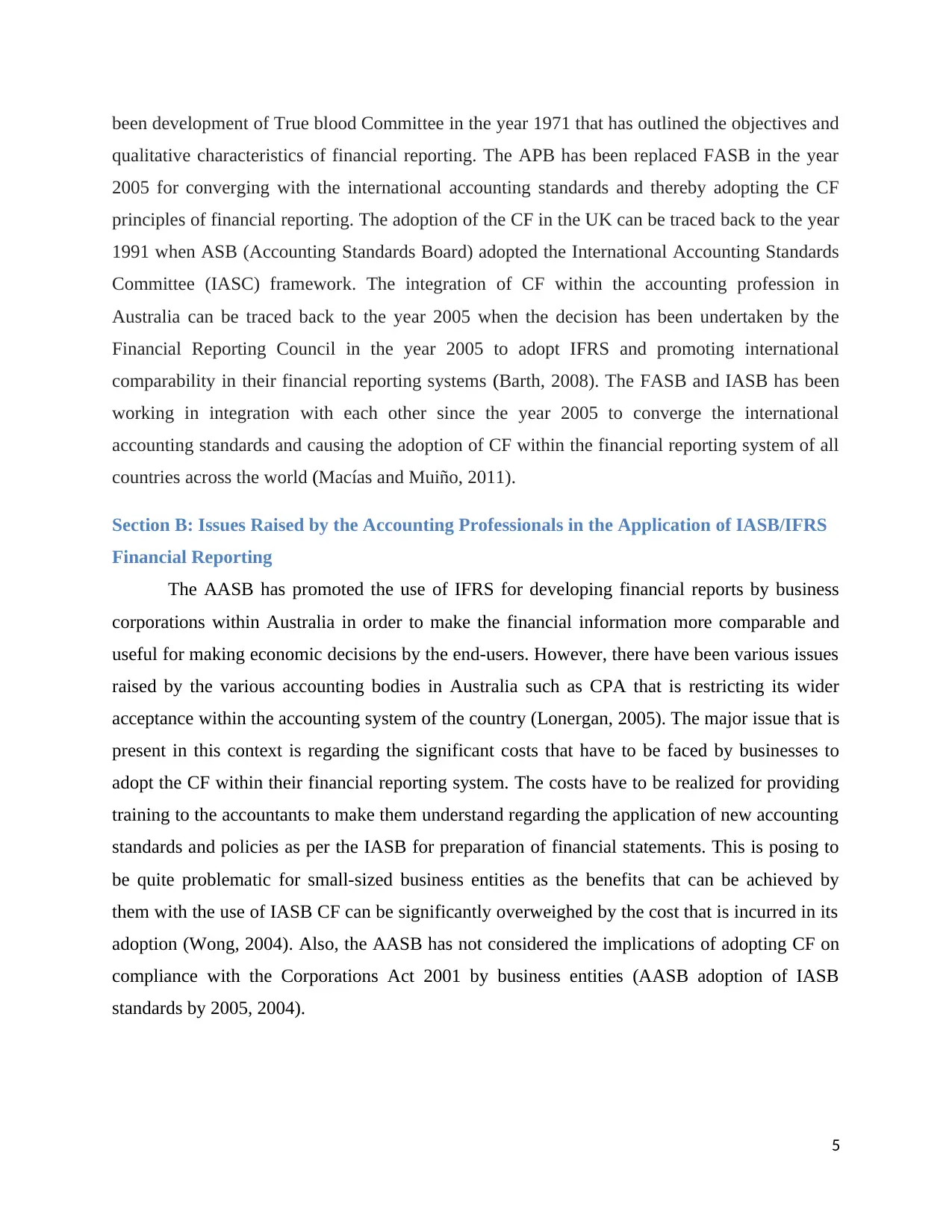
been development of True blood Committee in the year 1971 that has outlined the objectives and
qualitative characteristics of financial reporting. The APB has been replaced FASB in the year
2005 for converging with the international accounting standards and thereby adopting the CF
principles of financial reporting. The adoption of the CF in the UK can be traced back to the year
1991 when ASB (Accounting Standards Board) adopted the International Accounting Standards
Committee (IASC) framework. The integration of CF within the accounting profession in
Australia can be traced back to the year 2005 when the decision has been undertaken by the
Financial Reporting Council in the year 2005 to adopt IFRS and promoting international
comparability in their financial reporting systems (Barth, 2008). The FASB and IASB has been
working in integration with each other since the year 2005 to converge the international
accounting standards and causing the adoption of CF within the financial reporting system of all
countries across the world (Macías and Muiño, 2011).
Section B: Issues Raised by the Accounting Professionals in the Application of IASB/IFRS
Financial Reporting
The AASB has promoted the use of IFRS for developing financial reports by business
corporations within Australia in order to make the financial information more comparable and
useful for making economic decisions by the end-users. However, there have been various issues
raised by the various accounting bodies in Australia such as CPA that is restricting its wider
acceptance within the accounting system of the country (Lonergan, 2005). The major issue that is
present in this context is regarding the significant costs that have to be faced by businesses to
adopt the CF within their financial reporting system. The costs have to be realized for providing
training to the accountants to make them understand regarding the application of new accounting
standards and policies as per the IASB for preparation of financial statements. This is posing to
be quite problematic for small-sized business entities as the benefits that can be achieved by
them with the use of IASB CF can be significantly overweighed by the cost that is incurred in its
adoption (Wong, 2004). Also, the AASB has not considered the implications of adopting CF on
compliance with the Corporations Act 2001 by business entities (AASB adoption of IASB
standards by 2005, 2004).
5
qualitative characteristics of financial reporting. The APB has been replaced FASB in the year
2005 for converging with the international accounting standards and thereby adopting the CF
principles of financial reporting. The adoption of the CF in the UK can be traced back to the year
1991 when ASB (Accounting Standards Board) adopted the International Accounting Standards
Committee (IASC) framework. The integration of CF within the accounting profession in
Australia can be traced back to the year 2005 when the decision has been undertaken by the
Financial Reporting Council in the year 2005 to adopt IFRS and promoting international
comparability in their financial reporting systems (Barth, 2008). The FASB and IASB has been
working in integration with each other since the year 2005 to converge the international
accounting standards and causing the adoption of CF within the financial reporting system of all
countries across the world (Macías and Muiño, 2011).
Section B: Issues Raised by the Accounting Professionals in the Application of IASB/IFRS
Financial Reporting
The AASB has promoted the use of IFRS for developing financial reports by business
corporations within Australia in order to make the financial information more comparable and
useful for making economic decisions by the end-users. However, there have been various issues
raised by the various accounting bodies in Australia such as CPA that is restricting its wider
acceptance within the accounting system of the country (Lonergan, 2005). The major issue that is
present in this context is regarding the significant costs that have to be faced by businesses to
adopt the CF within their financial reporting system. The costs have to be realized for providing
training to the accountants to make them understand regarding the application of new accounting
standards and policies as per the IASB for preparation of financial statements. This is posing to
be quite problematic for small-sized business entities as the benefits that can be achieved by
them with the use of IASB CF can be significantly overweighed by the cost that is incurred in its
adoption (Wong, 2004). Also, the AASB has not considered the implications of adopting CF on
compliance with the Corporations Act 2001 by business entities (AASB adoption of IASB
standards by 2005, 2004).
5
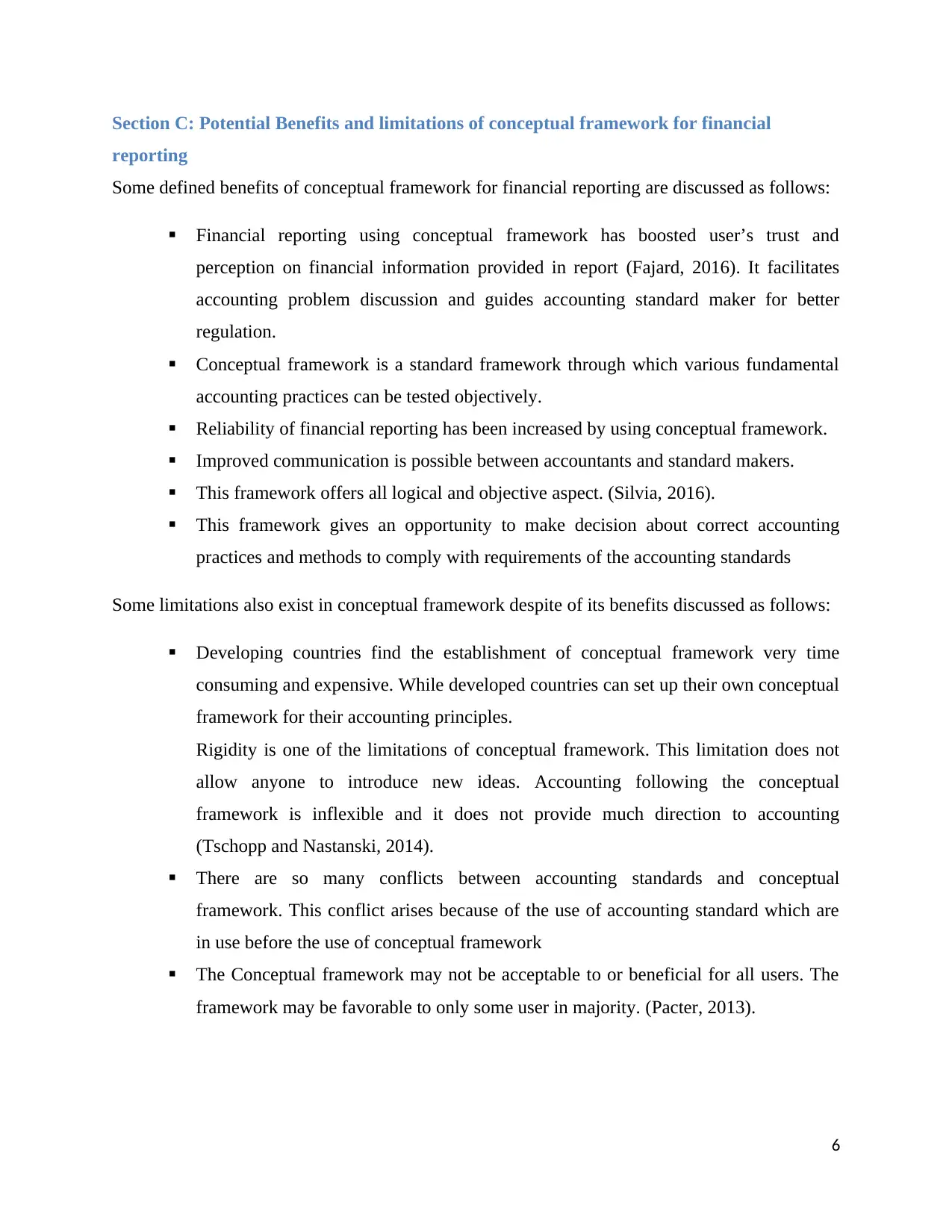
Section C: Potential Benefits and limitations of conceptual framework for financial
reporting
Some defined benefits of conceptual framework for financial reporting are discussed as follows:
Financial reporting using conceptual framework has boosted user’s trust and
perception on financial information provided in report (Fajard, 2016). It facilitates
accounting problem discussion and guides accounting standard maker for better
regulation.
Conceptual framework is a standard framework through which various fundamental
accounting practices can be tested objectively.
Reliability of financial reporting has been increased by using conceptual framework.
Improved communication is possible between accountants and standard makers.
This framework offers all logical and objective aspect. (Silvia, 2016).
This framework gives an opportunity to make decision about correct accounting
practices and methods to comply with requirements of the accounting standards
Some limitations also exist in conceptual framework despite of its benefits discussed as follows:
Developing countries find the establishment of conceptual framework very time
consuming and expensive. While developed countries can set up their own conceptual
framework for their accounting principles.
Rigidity is one of the limitations of conceptual framework. This limitation does not
allow anyone to introduce new ideas. Accounting following the conceptual
framework is inflexible and it does not provide much direction to accounting
(Tschopp and Nastanski, 2014).
There are so many conflicts between accounting standards and conceptual
framework. This conflict arises because of the use of accounting standard which are
in use before the use of conceptual framework
The Conceptual framework may not be acceptable to or beneficial for all users. The
framework may be favorable to only some user in majority. (Pacter, 2013).
6
reporting
Some defined benefits of conceptual framework for financial reporting are discussed as follows:
Financial reporting using conceptual framework has boosted user’s trust and
perception on financial information provided in report (Fajard, 2016). It facilitates
accounting problem discussion and guides accounting standard maker for better
regulation.
Conceptual framework is a standard framework through which various fundamental
accounting practices can be tested objectively.
Reliability of financial reporting has been increased by using conceptual framework.
Improved communication is possible between accountants and standard makers.
This framework offers all logical and objective aspect. (Silvia, 2016).
This framework gives an opportunity to make decision about correct accounting
practices and methods to comply with requirements of the accounting standards
Some limitations also exist in conceptual framework despite of its benefits discussed as follows:
Developing countries find the establishment of conceptual framework very time
consuming and expensive. While developed countries can set up their own conceptual
framework for their accounting principles.
Rigidity is one of the limitations of conceptual framework. This limitation does not
allow anyone to introduce new ideas. Accounting following the conceptual
framework is inflexible and it does not provide much direction to accounting
(Tschopp and Nastanski, 2014).
There are so many conflicts between accounting standards and conceptual
framework. This conflict arises because of the use of accounting standard which are
in use before the use of conceptual framework
The Conceptual framework may not be acceptable to or beneficial for all users. The
framework may be favorable to only some user in majority. (Pacter, 2013).
6
⊘ This is a preview!⊘
Do you want full access?
Subscribe today to unlock all pages.

Trusted by 1+ million students worldwide
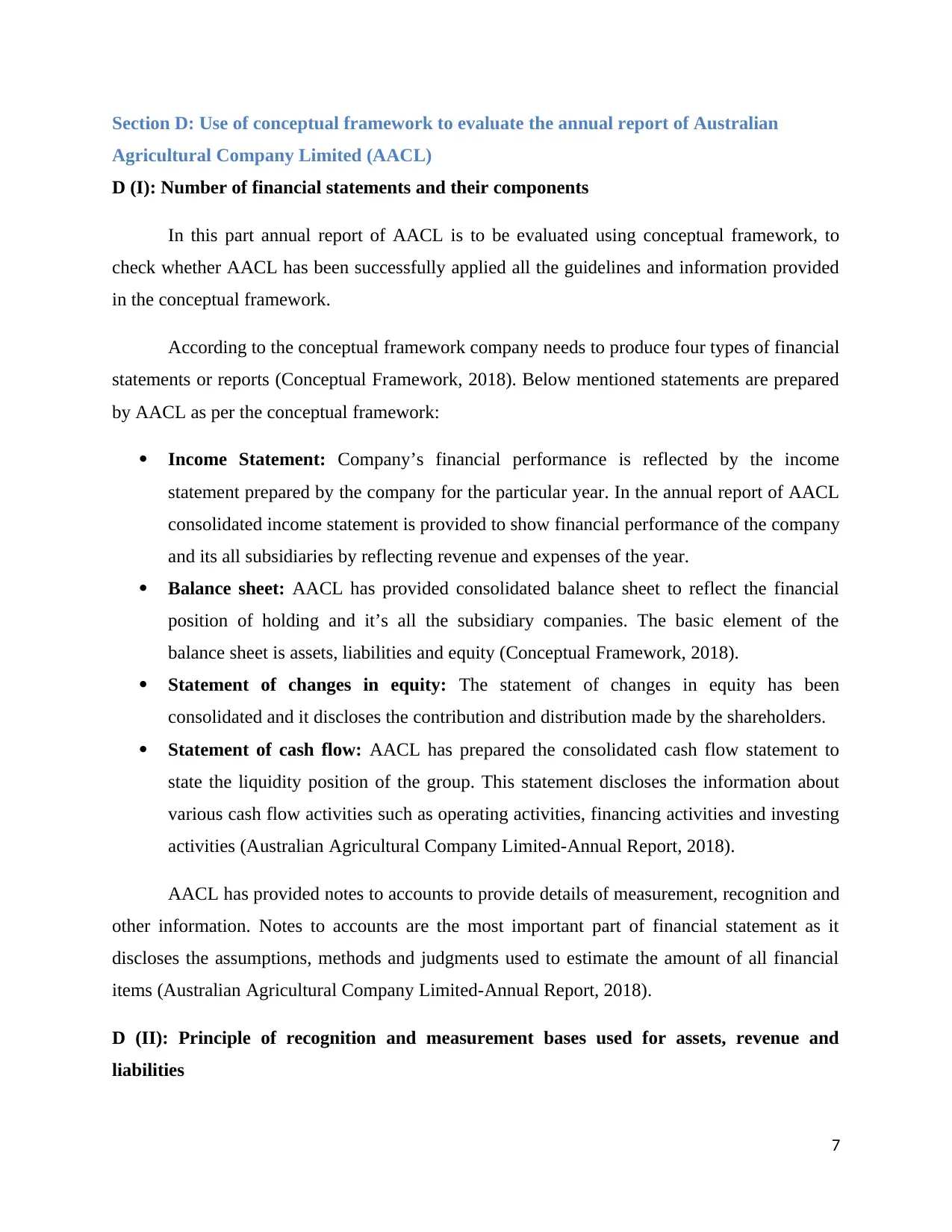
Section D: Use of conceptual framework to evaluate the annual report of Australian
Agricultural Company Limited (AACL)
D (I): Number of financial statements and their components
In this part annual report of AACL is to be evaluated using conceptual framework, to
check whether AACL has been successfully applied all the guidelines and information provided
in the conceptual framework.
According to the conceptual framework company needs to produce four types of financial
statements or reports (Conceptual Framework, 2018). Below mentioned statements are prepared
by AACL as per the conceptual framework:
Income Statement: Company’s financial performance is reflected by the income
statement prepared by the company for the particular year. In the annual report of AACL
consolidated income statement is provided to show financial performance of the company
and its all subsidiaries by reflecting revenue and expenses of the year.
Balance sheet: AACL has provided consolidated balance sheet to reflect the financial
position of holding and it’s all the subsidiary companies. The basic element of the
balance sheet is assets, liabilities and equity (Conceptual Framework, 2018).
Statement of changes in equity: The statement of changes in equity has been
consolidated and it discloses the contribution and distribution made by the shareholders.
Statement of cash flow: AACL has prepared the consolidated cash flow statement to
state the liquidity position of the group. This statement discloses the information about
various cash flow activities such as operating activities, financing activities and investing
activities (Australian Agricultural Company Limited-Annual Report, 2018).
AACL has provided notes to accounts to provide details of measurement, recognition and
other information. Notes to accounts are the most important part of financial statement as it
discloses the assumptions, methods and judgments used to estimate the amount of all financial
items (Australian Agricultural Company Limited-Annual Report, 2018).
D (II): Principle of recognition and measurement bases used for assets, revenue and
liabilities
7
Agricultural Company Limited (AACL)
D (I): Number of financial statements and their components
In this part annual report of AACL is to be evaluated using conceptual framework, to
check whether AACL has been successfully applied all the guidelines and information provided
in the conceptual framework.
According to the conceptual framework company needs to produce four types of financial
statements or reports (Conceptual Framework, 2018). Below mentioned statements are prepared
by AACL as per the conceptual framework:
Income Statement: Company’s financial performance is reflected by the income
statement prepared by the company for the particular year. In the annual report of AACL
consolidated income statement is provided to show financial performance of the company
and its all subsidiaries by reflecting revenue and expenses of the year.
Balance sheet: AACL has provided consolidated balance sheet to reflect the financial
position of holding and it’s all the subsidiary companies. The basic element of the
balance sheet is assets, liabilities and equity (Conceptual Framework, 2018).
Statement of changes in equity: The statement of changes in equity has been
consolidated and it discloses the contribution and distribution made by the shareholders.
Statement of cash flow: AACL has prepared the consolidated cash flow statement to
state the liquidity position of the group. This statement discloses the information about
various cash flow activities such as operating activities, financing activities and investing
activities (Australian Agricultural Company Limited-Annual Report, 2018).
AACL has provided notes to accounts to provide details of measurement, recognition and
other information. Notes to accounts are the most important part of financial statement as it
discloses the assumptions, methods and judgments used to estimate the amount of all financial
items (Australian Agricultural Company Limited-Annual Report, 2018).
D (II): Principle of recognition and measurement bases used for assets, revenue and
liabilities
7
Paraphrase This Document
Need a fresh take? Get an instant paraphrase of this document with our AI Paraphraser
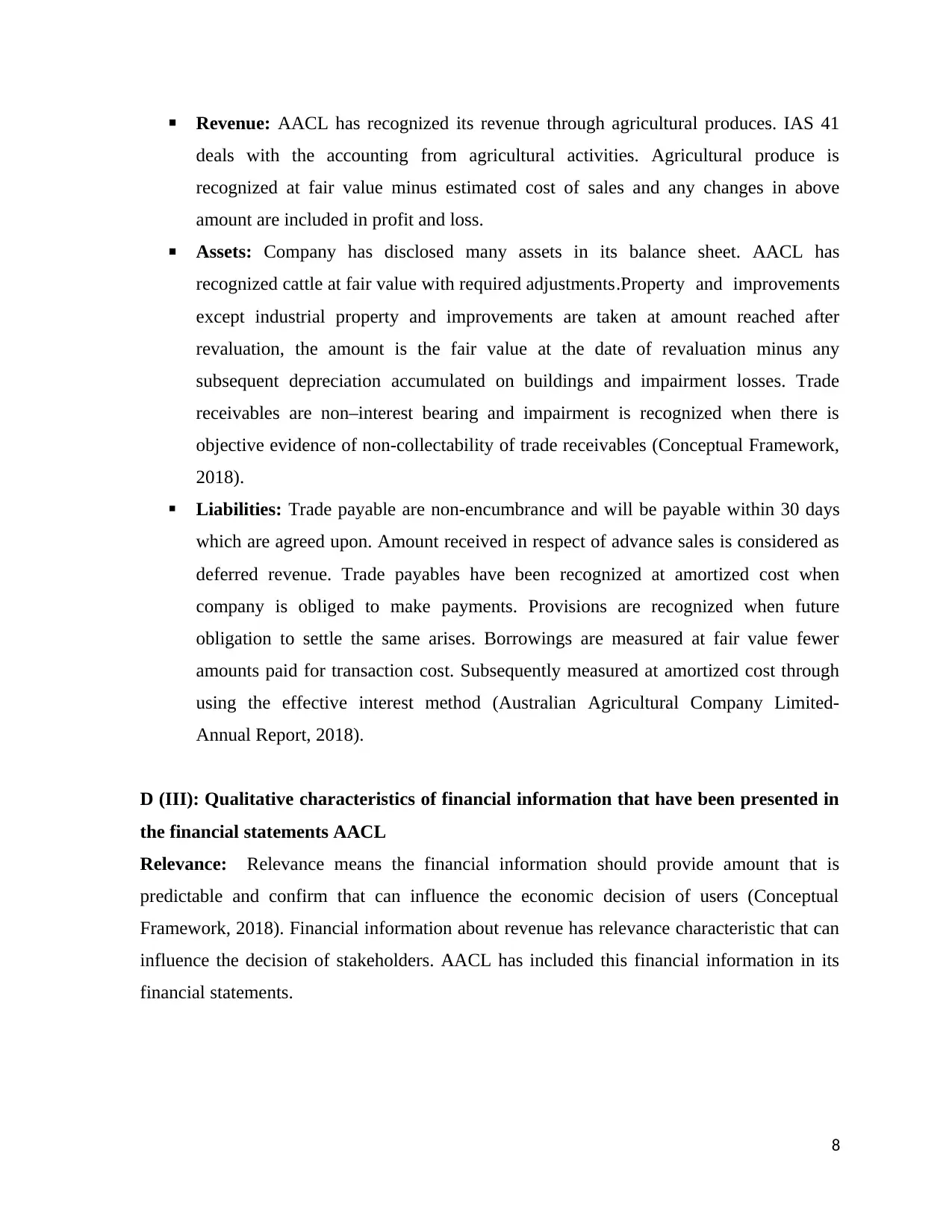
Revenue: AACL has recognized its revenue through agricultural produces. IAS 41
deals with the accounting from agricultural activities. Agricultural produce is
recognized at fair value minus estimated cost of sales and any changes in above
amount are included in profit and loss.
Assets: Company has disclosed many assets in its balance sheet. AACL has
recognized cattle at fair value with required adjustments.Property and improvements
except industrial property and improvements are taken at amount reached after
revaluation, the amount is the fair value at the date of revaluation minus any
subsequent depreciation accumulated on buildings and impairment losses. Trade
receivables are non–interest bearing and impairment is recognized when there is
objective evidence of non-collectability of trade receivables (Conceptual Framework,
2018).
Liabilities: Trade payable are non-encumbrance and will be payable within 30 days
which are agreed upon. Amount received in respect of advance sales is considered as
deferred revenue. Trade payables have been recognized at amortized cost when
company is obliged to make payments. Provisions are recognized when future
obligation to settle the same arises. Borrowings are measured at fair value fewer
amounts paid for transaction cost. Subsequently measured at amortized cost through
using the effective interest method (Australian Agricultural Company Limited-
Annual Report, 2018).
D (III): Qualitative characteristics of financial information that have been presented in
the financial statements AACL
Relevance: Relevance means the financial information should provide amount that is
predictable and confirm that can influence the economic decision of users (Conceptual
Framework, 2018). Financial information about revenue has relevance characteristic that can
influence the decision of stakeholders. AACL has included this financial information in its
financial statements.
8
deals with the accounting from agricultural activities. Agricultural produce is
recognized at fair value minus estimated cost of sales and any changes in above
amount are included in profit and loss.
Assets: Company has disclosed many assets in its balance sheet. AACL has
recognized cattle at fair value with required adjustments.Property and improvements
except industrial property and improvements are taken at amount reached after
revaluation, the amount is the fair value at the date of revaluation minus any
subsequent depreciation accumulated on buildings and impairment losses. Trade
receivables are non–interest bearing and impairment is recognized when there is
objective evidence of non-collectability of trade receivables (Conceptual Framework,
2018).
Liabilities: Trade payable are non-encumbrance and will be payable within 30 days
which are agreed upon. Amount received in respect of advance sales is considered as
deferred revenue. Trade payables have been recognized at amortized cost when
company is obliged to make payments. Provisions are recognized when future
obligation to settle the same arises. Borrowings are measured at fair value fewer
amounts paid for transaction cost. Subsequently measured at amortized cost through
using the effective interest method (Australian Agricultural Company Limited-
Annual Report, 2018).
D (III): Qualitative characteristics of financial information that have been presented in
the financial statements AACL
Relevance: Relevance means the financial information should provide amount that is
predictable and confirm that can influence the economic decision of users (Conceptual
Framework, 2018). Financial information about revenue has relevance characteristic that can
influence the decision of stakeholders. AACL has included this financial information in its
financial statements.
8
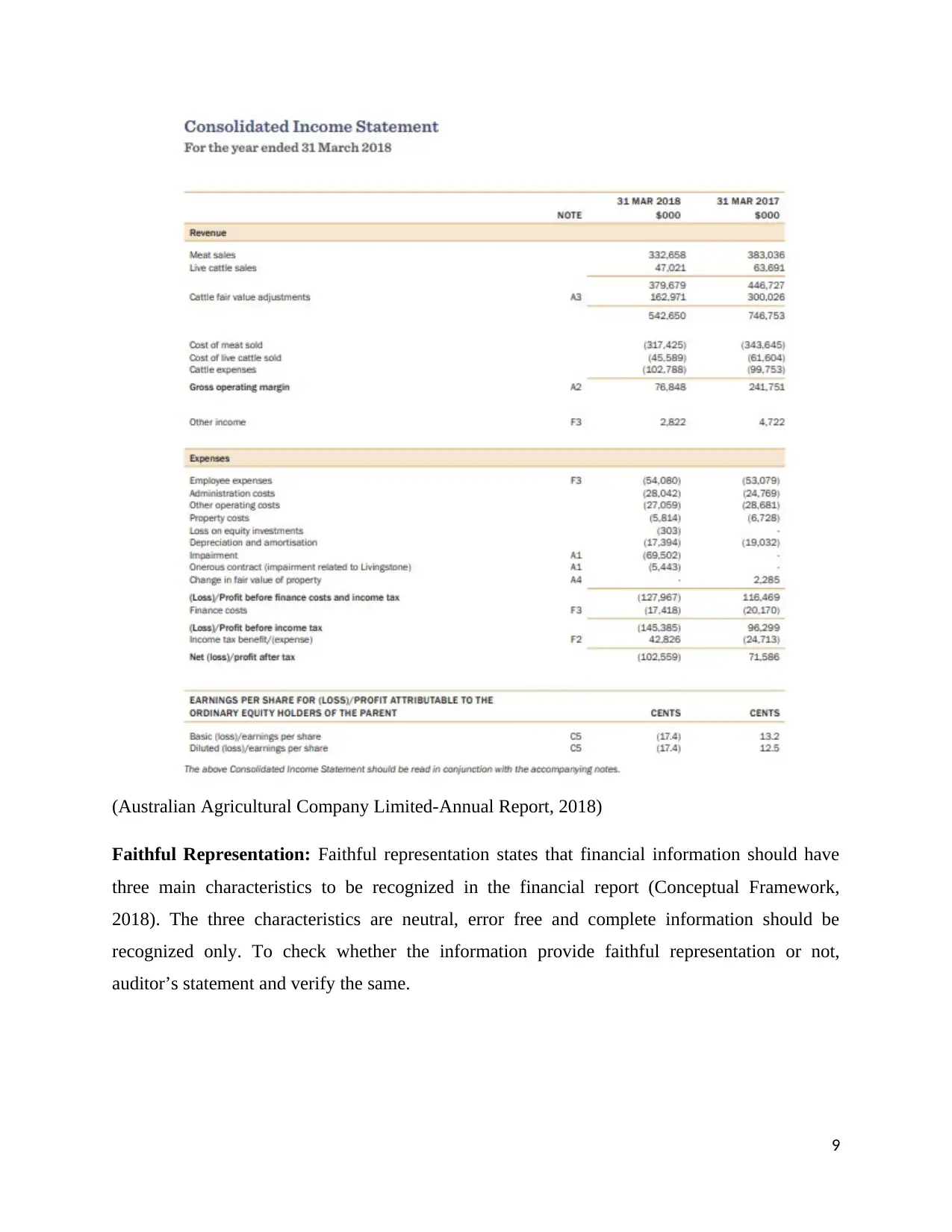
(Australian Agricultural Company Limited-Annual Report, 2018)
Faithful Representation: Faithful representation states that financial information should have
three main characteristics to be recognized in the financial report (Conceptual Framework,
2018). The three characteristics are neutral, error free and complete information should be
recognized only. To check whether the information provide faithful representation or not,
auditor’s statement and verify the same.
9
Faithful Representation: Faithful representation states that financial information should have
three main characteristics to be recognized in the financial report (Conceptual Framework,
2018). The three characteristics are neutral, error free and complete information should be
recognized only. To check whether the information provide faithful representation or not,
auditor’s statement and verify the same.
9
⊘ This is a preview!⊘
Do you want full access?
Subscribe today to unlock all pages.

Trusted by 1+ million students worldwide
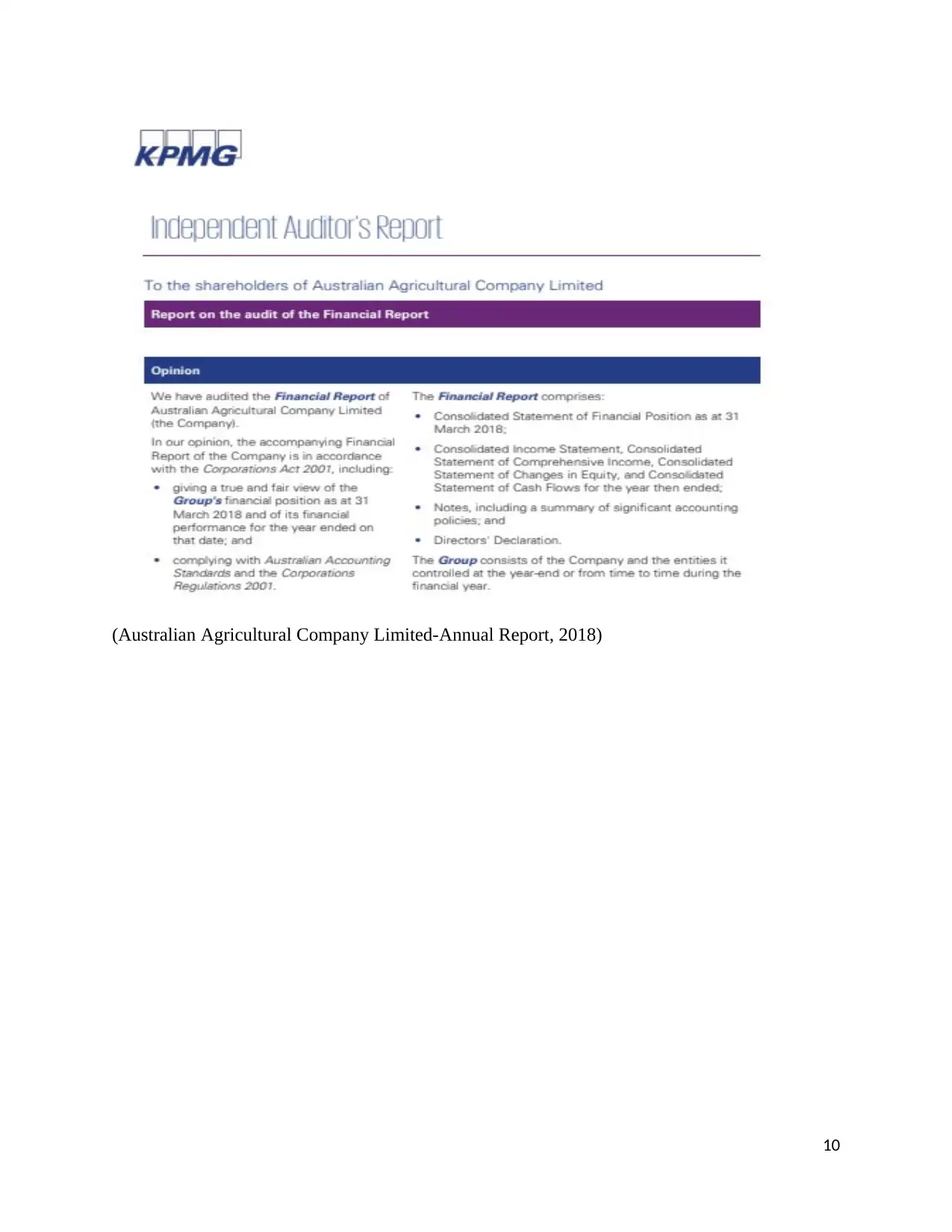
(Australian Agricultural Company Limited-Annual Report, 2018)
10
10
Paraphrase This Document
Need a fresh take? Get an instant paraphrase of this document with our AI Paraphraser
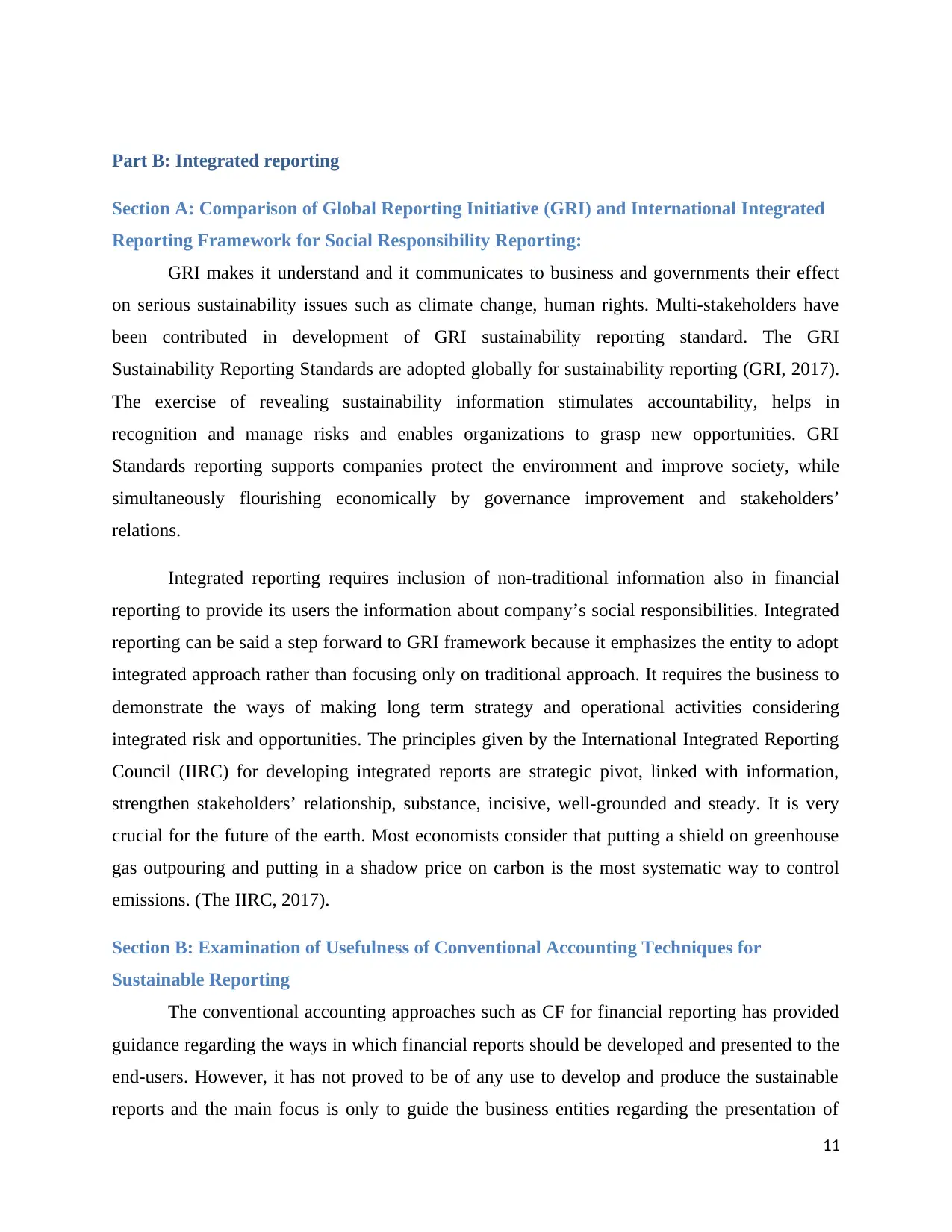
Part B: Integrated reporting
Section A: Comparison of Global Reporting Initiative (GRI) and International Integrated
Reporting Framework for Social Responsibility Reporting:
GRI makes it understand and it communicates to business and governments their effect
on serious sustainability issues such as climate change, human rights. Multi-stakeholders have
been contributed in development of GRI sustainability reporting standard. The GRI
Sustainability Reporting Standards are adopted globally for sustainability reporting (GRI, 2017).
The exercise of revealing sustainability information stimulates accountability, helps in
recognition and manage risks and enables organizations to grasp new opportunities. GRI
Standards reporting supports companies protect the environment and improve society, while
simultaneously flourishing economically by governance improvement and stakeholders’
relations.
Integrated reporting requires inclusion of non-traditional information also in financial
reporting to provide its users the information about company’s social responsibilities. Integrated
reporting can be said a step forward to GRI framework because it emphasizes the entity to adopt
integrated approach rather than focusing only on traditional approach. It requires the business to
demonstrate the ways of making long term strategy and operational activities considering
integrated risk and opportunities. The principles given by the International Integrated Reporting
Council (IIRC) for developing integrated reports are strategic pivot, linked with information,
strengthen stakeholders’ relationship, substance, incisive, well-grounded and steady. It is very
crucial for the future of the earth. Most economists consider that putting a shield on greenhouse
gas outpouring and putting in a shadow price on carbon is the most systematic way to control
emissions. (The IIRC, 2017).
Section B: Examination of Usefulness of Conventional Accounting Techniques for
Sustainable Reporting
The conventional accounting approaches such as CF for financial reporting has provided
guidance regarding the ways in which financial reports should be developed and presented to the
end-users. However, it has not proved to be of any use to develop and produce the sustainable
reports and the main focus is only to guide the business entities regarding the presentation of
11
Section A: Comparison of Global Reporting Initiative (GRI) and International Integrated
Reporting Framework for Social Responsibility Reporting:
GRI makes it understand and it communicates to business and governments their effect
on serious sustainability issues such as climate change, human rights. Multi-stakeholders have
been contributed in development of GRI sustainability reporting standard. The GRI
Sustainability Reporting Standards are adopted globally for sustainability reporting (GRI, 2017).
The exercise of revealing sustainability information stimulates accountability, helps in
recognition and manage risks and enables organizations to grasp new opportunities. GRI
Standards reporting supports companies protect the environment and improve society, while
simultaneously flourishing economically by governance improvement and stakeholders’
relations.
Integrated reporting requires inclusion of non-traditional information also in financial
reporting to provide its users the information about company’s social responsibilities. Integrated
reporting can be said a step forward to GRI framework because it emphasizes the entity to adopt
integrated approach rather than focusing only on traditional approach. It requires the business to
demonstrate the ways of making long term strategy and operational activities considering
integrated risk and opportunities. The principles given by the International Integrated Reporting
Council (IIRC) for developing integrated reports are strategic pivot, linked with information,
strengthen stakeholders’ relationship, substance, incisive, well-grounded and steady. It is very
crucial for the future of the earth. Most economists consider that putting a shield on greenhouse
gas outpouring and putting in a shadow price on carbon is the most systematic way to control
emissions. (The IIRC, 2017).
Section B: Examination of Usefulness of Conventional Accounting Techniques for
Sustainable Reporting
The conventional accounting approaches such as CF for financial reporting has provided
guidance regarding the ways in which financial reports should be developed and presented to the
end-users. However, it has not proved to be of any use to develop and produce the sustainable
reports and the main focus is only to guide the business entities regarding the presentation of
11
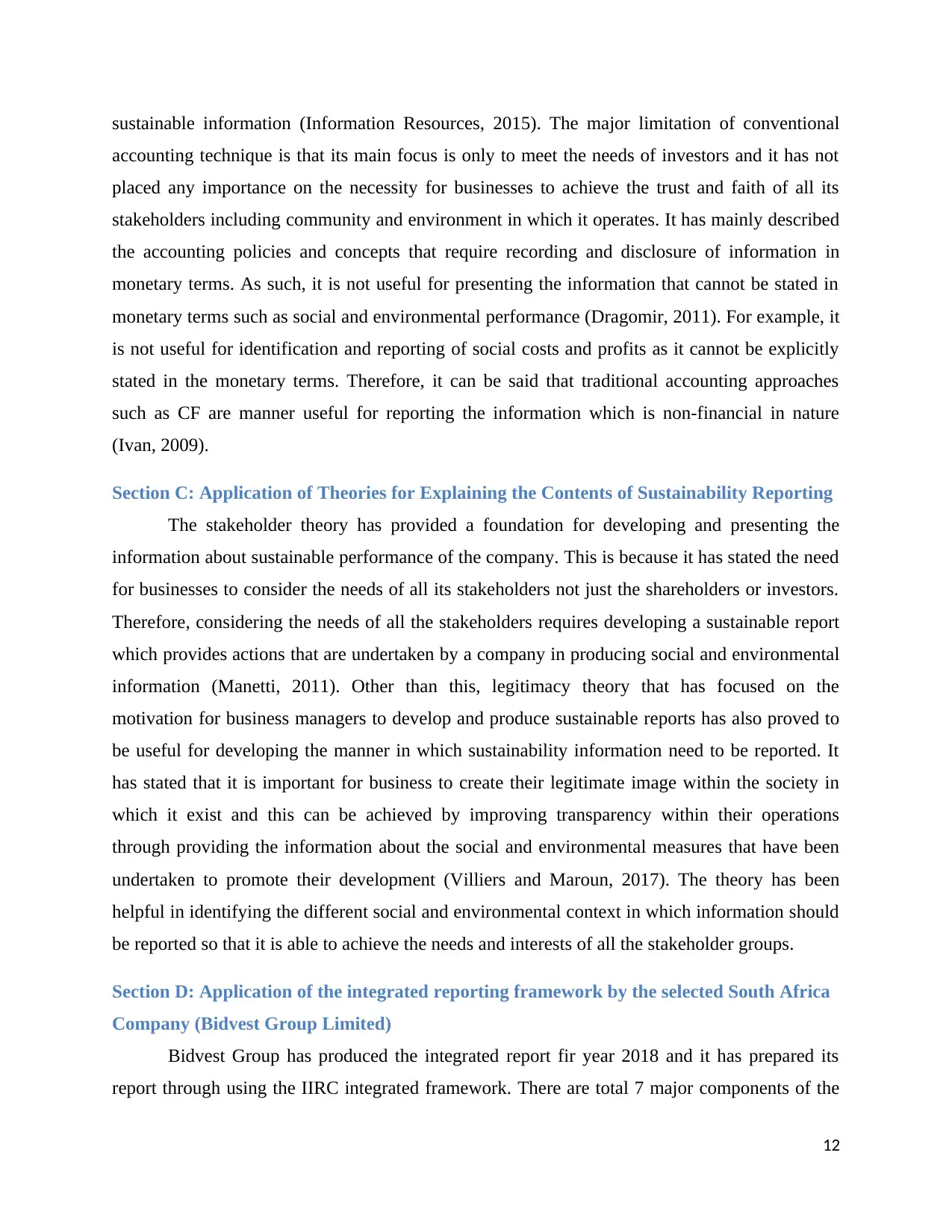
sustainable information (Information Resources, 2015). The major limitation of conventional
accounting technique is that its main focus is only to meet the needs of investors and it has not
placed any importance on the necessity for businesses to achieve the trust and faith of all its
stakeholders including community and environment in which it operates. It has mainly described
the accounting policies and concepts that require recording and disclosure of information in
monetary terms. As such, it is not useful for presenting the information that cannot be stated in
monetary terms such as social and environmental performance (Dragomir, 2011). For example, it
is not useful for identification and reporting of social costs and profits as it cannot be explicitly
stated in the monetary terms. Therefore, it can be said that traditional accounting approaches
such as CF are manner useful for reporting the information which is non-financial in nature
(Ivan, 2009).
Section C: Application of Theories for Explaining the Contents of Sustainability Reporting
The stakeholder theory has provided a foundation for developing and presenting the
information about sustainable performance of the company. This is because it has stated the need
for businesses to consider the needs of all its stakeholders not just the shareholders or investors.
Therefore, considering the needs of all the stakeholders requires developing a sustainable report
which provides actions that are undertaken by a company in producing social and environmental
information (Manetti, 2011). Other than this, legitimacy theory that has focused on the
motivation for business managers to develop and produce sustainable reports has also proved to
be useful for developing the manner in which sustainability information need to be reported. It
has stated that it is important for business to create their legitimate image within the society in
which it exist and this can be achieved by improving transparency within their operations
through providing the information about the social and environmental measures that have been
undertaken to promote their development (Villiers and Maroun, 2017). The theory has been
helpful in identifying the different social and environmental context in which information should
be reported so that it is able to achieve the needs and interests of all the stakeholder groups.
Section D: Application of the integrated reporting framework by the selected South Africa
Company (Bidvest Group Limited)
Bidvest Group has produced the integrated report fir year 2018 and it has prepared its
report through using the IIRC integrated framework. There are total 7 major components of the
12
accounting technique is that its main focus is only to meet the needs of investors and it has not
placed any importance on the necessity for businesses to achieve the trust and faith of all its
stakeholders including community and environment in which it operates. It has mainly described
the accounting policies and concepts that require recording and disclosure of information in
monetary terms. As such, it is not useful for presenting the information that cannot be stated in
monetary terms such as social and environmental performance (Dragomir, 2011). For example, it
is not useful for identification and reporting of social costs and profits as it cannot be explicitly
stated in the monetary terms. Therefore, it can be said that traditional accounting approaches
such as CF are manner useful for reporting the information which is non-financial in nature
(Ivan, 2009).
Section C: Application of Theories for Explaining the Contents of Sustainability Reporting
The stakeholder theory has provided a foundation for developing and presenting the
information about sustainable performance of the company. This is because it has stated the need
for businesses to consider the needs of all its stakeholders not just the shareholders or investors.
Therefore, considering the needs of all the stakeholders requires developing a sustainable report
which provides actions that are undertaken by a company in producing social and environmental
information (Manetti, 2011). Other than this, legitimacy theory that has focused on the
motivation for business managers to develop and produce sustainable reports has also proved to
be useful for developing the manner in which sustainability information need to be reported. It
has stated that it is important for business to create their legitimate image within the society in
which it exist and this can be achieved by improving transparency within their operations
through providing the information about the social and environmental measures that have been
undertaken to promote their development (Villiers and Maroun, 2017). The theory has been
helpful in identifying the different social and environmental context in which information should
be reported so that it is able to achieve the needs and interests of all the stakeholder groups.
Section D: Application of the integrated reporting framework by the selected South Africa
Company (Bidvest Group Limited)
Bidvest Group has produced the integrated report fir year 2018 and it has prepared its
report through using the IIRC integrated framework. There are total 7 major components of the
12
⊘ This is a preview!⊘
Do you want full access?
Subscribe today to unlock all pages.

Trusted by 1+ million students worldwide
1 out of 19
Related Documents
Your All-in-One AI-Powered Toolkit for Academic Success.
+13062052269
info@desklib.com
Available 24*7 on WhatsApp / Email
![[object Object]](/_next/static/media/star-bottom.7253800d.svg)
Unlock your academic potential
Copyright © 2020–2026 A2Z Services. All Rights Reserved. Developed and managed by ZUCOL.





